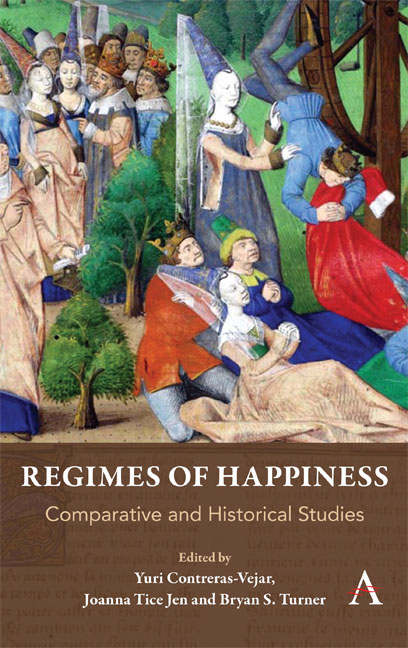Book contents
- Frontmatter
- Contents
- Acknowledgements
- Notes on Contributors
- Introduction: Reflections on Regimes of Happiness
- Part I Happiness in the West
- Part II Comparative Perspectives
- Chapter Ten And You Should Be Nothing but Happy: Judaism and the Dual Approach to Joy
- Chapter Eleven Happiness in Medieval Islamicate Literature: Conceptual and Practical Problems
- Chapter Twelve From Liberation to Happiness: The Making of Modern, Middle-Class Yoga
- Chapter Thirteen The Pursuit of Happiness in Vietnam
- Chapter Fourteen Indigenous and Western Views of Happiness: An Essay on the Politics of Contentment
- Chapter Fifteen A Nineteenth-Century Turning Point: Nietzsche, Weber, Freud and Mill
- Index
Chapter Fifteen - A Nineteenth-Century Turning Point: Nietzsche, Weber, Freud and Mill
from Part II - Comparative Perspectives
Published online by Cambridge University Press: 29 May 2019
- Frontmatter
- Contents
- Acknowledgements
- Notes on Contributors
- Introduction: Reflections on Regimes of Happiness
- Part I Happiness in the West
- Part II Comparative Perspectives
- Chapter Ten And You Should Be Nothing but Happy: Judaism and the Dual Approach to Joy
- Chapter Eleven Happiness in Medieval Islamicate Literature: Conceptual and Practical Problems
- Chapter Twelve From Liberation to Happiness: The Making of Modern, Middle-Class Yoga
- Chapter Thirteen The Pursuit of Happiness in Vietnam
- Chapter Fourteen Indigenous and Western Views of Happiness: An Essay on the Politics of Contentment
- Chapter Fifteen A Nineteenth-Century Turning Point: Nietzsche, Weber, Freud and Mill
- Index
Summary
Introduction
Happiness as the ultimate goal of human endeavour is a thread running through theology and philosophy from the ancient Greeks to modern times. Such a claim raises immediately a host of critical objections and problems relating to the idea of cultural relativism. Can the theme of happiness be continuous and how would we know that? One way to overcome this dilemma is to identify ‘regimes of happiness’ – that is, clusters of ideas, practices and institutions that in one way or another connect to broad ideas of human wellbeing, flourishing and satisfaction or Eudaimonia to use the word that dominates Aristotle's Nicomachean Ethics (Contreras- Vejar and Turner, 2018). Contemporary discussions of happiness almost invariably start with Aristotle (Nagel, 1972). However, the methodology here is to some extent borrowed from Michel Foucault to understand the ‘genealogy’ of happiness across different social and cultural formations. In the Western world one could identify an Aristotelian regime of happiness based on the idea of a sound polity and flourishing citizens. There is also a Christian regime of happiness around such figures as St. Augustine and within which there have been radical shifts most notably brought about by Luther and the Protestant Reformation. Regimes of happiness can overlap with each other and their borders are obviously fuzzy. Some regimes may last a long time in various forms. For example, Aristotle's treatment of happiness is one of the most cited versions of happiness across the West. The idea of happiness is, however, not confined to the West. For example, the Vietnamese Constitution that was devised by Ho Chi Minh, an admirer of America society, crafted the 1945 Constitution with three key words as its primary values – Independence–freedom–happiness (or niem hanh phuc). The 2013 version of the Constitution in Article 3 says, ‘The state guarantees […] that people enjoy what is abundant and free for a happy life with conditions for all- round development.’
One further notion behind our discussion of ‘regimes of happiness’ is that in principle we can detect important shifts in regimes that are associated both with specific networks of individual thinkers, and with institutional changes in the location of intellectuals in these networks. In this chapter I am especially interested in the transitions in thinking about happiness from the late eighteenth century and through the nineteenth century.
- Type
- Chapter
- Information
- Regimes of HappinessComparative and Historical Studies, pp. 235 - 248Publisher: Anthem PressPrint publication year: 2019

